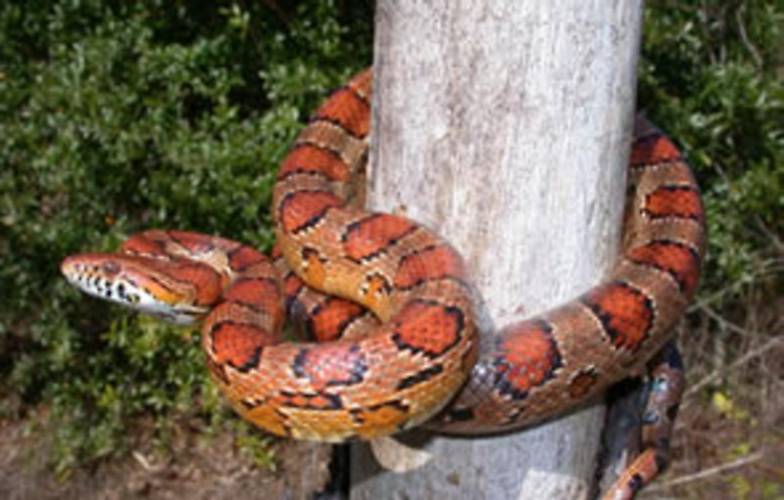Cornsnake (Elaphe Guttata)
By Edward W. Brown; posted February 5, 2011
View Original: Click to zoom, then click to magnify (800 x 510) 92KB

|
This is a corn snake, also knoan as a red rat snake. it has a much more colorful pattern than the orange phase yellow rat snake (AKA Everglades Rat Snake) which made a guest appearance in Larry's kitchen. [id=301455236] Cornsnakes are probably the most common pet snake, and they come in different color phases, this one appears to be the Okeetee variant which is the most colorful naturally occuring type. With selective breeding, these can be made to display a lot of very colorful and unique patterns. . The [id=294785410; black rat snake] is another member of the family. This is the description of the corn snake from the North Carolina reptiles and amphibians website: Description: Corn snakes are rather large snakes distinguished by squarish blotches of red on an orange, brown or gray background. Alternating rows of smaller blotches run along their sides. In the Coastal Plain, corn snakes are generally much brighter, with more orange in their background color, than those found in other parts of the state. Corn snakes have weakly keeled scales. The young are patterned like the adults, except the blotches on their backs are usually much darker. Feeding/Diet: Corn snakes are very strong constrictors that eat primarily mice and other rodents. They may eat birds and, when young, may often feed on lizards and treefrogs. Activity/Behavior: Corn snakes are most active at night during the warmer months. Habitat/Range: Corn snakes are commonly found around the edges of old fields and other clearings, where they often hide under the bark of dead pine trees or under logs, old boards, and tin. Reproduction: Corn snakes lay 7–31 eggs during the months of June and July. Miscellaneous: Corn snakes get their name because they often inhabit barns where mice and rats feed on corn and other grains. Additionally, the black and white checkerboard belly of the corn snake somewhat resembles Indian corn. Unfortunately, corn snakes are often mistaken for copperheads and killed. They are commonly kept as pets and are generally docile when captured, though they will sometimes bite. |